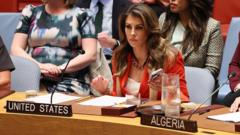Why Did the US Block the UN Gaza Ceasefire for the Sixth Time?

Published: 2025-09-19 06:10:22 | Category: world
This article discusses the recent veto by the United States at the United Nations Security Council regarding a draft resolution calling for an immediate and permanent ceasefire in Gaza. The veto, which marks the sixth instance of the US blocking such a resolution, has drawn criticism from other UN members and highlights the increasing isolation of Israel and its allies. The humanitarian situation in Gaza continues to deteriorate, as military actions escalate.
Last updated: 02 October 2023 (BST)
Key Takeaways
- The US has vetoed a UN resolution for a ceasefire and humanitarian aid in Gaza.
- All other Security Council members supported the resolution, citing a "catastrophic" humanitarian situation.
- US officials argue the resolution fails to adequately condemn Hamas or recognise Israel's self-defence rights.
- International reactions have been overwhelmingly critical of the US veto.
- The ongoing conflict has led to significant casualties in Gaza and widespread displacement of civilians.
The Veto and Its Implications
The US veto of the draft resolution at the UN Security Council has significant implications for the ongoing humanitarian crisis in Gaza. The proposal aimed to establish an immediate ceasefire and facilitate humanitarian aid, reflecting growing international concern over the escalating violence.
US Deputy Middle East envoy Morgan Ortagus defended the veto, emphasising that the resolution did not sufficiently condemn Hamas or acknowledge Israel's right to defend itself. This stance indicates a continued US commitment to supporting Israel in its military operations, despite widespread condemnation from other nations.
International Reactions to the Veto
The reaction from other UN member states was swift and overwhelmingly negative. Palestinian Ambassador to the UN, Riyad Mansour, expressed that the US's decision was "deeply regrettable and painful." He argued it hindered the Security Council's ability to address the ongoing atrocities in Gaza.
Pakistan's ambassador, Asim Ahmad, called the veto "a dark moment," while Algeria's ambassador, Amar Bendjama, extended apologies to the Palestinian people, highlighting a perceived failure of the international community to uphold rights that are often discussed but not acted upon.
The Humanitarian Crisis in Gaza
The humanitarian situation in Gaza has reached alarming levels, with reports describing it as "catastrophic." The UN's humanitarian office has indicated that the essential lifelines for civilians are collapsing under the weight of ongoing military offensives.
As Israeli forces intensify their ground operations, thousands of civilians have been forced to flee, exacerbating the already dire conditions. Olga Cherevko, a spokeswoman for the UN's humanitarian office, stated that the situation in Gaza City is "nothing short of cataclysmic."
Casualties and Displacement
Since the beginning of the Israeli military campaign in Gaza, following the Hamas-led attack on southern Israel on 7 October 2023, there have been staggering casualties. The Health Ministry in Gaza reports over 65,141 deaths due to Israeli attacks, with an additional 435 fatalities attributed to malnutrition and starvation.
The ongoing conflict has resulted in significant civilian displacement, with many fleeing their homes in search of safety. The humanitarian implications of this crisis continue to grow, as access to basic necessities becomes increasingly restricted.
Contextualising the Conflict
The current escalation in Gaza is rooted in long-standing tensions between Israel and Hamas, a militant group governing the Gaza Strip. The recent violence was prompted by a deadly attack by Hamas on Israeli territory, leading to a robust military response from Israel.
In the context of international law and humanitarian standards, the actions of both sides have drawn scrutiny. The Israeli military operations aim to dismantle Hamas's military capabilities, but the resultant civilian casualties and destruction have raised questions about proportionality and the protection of non-combatants.
The Role of International Bodies
The United Nations, through its various agencies, plays a critical role in addressing humanitarian crises and facilitating peace negotiations. However, the effectiveness of the UN Security Council has been called into question, particularly when a permanent member like the US exercises its veto power.
As world leaders prepare to gather for the upcoming UN General Assembly, the situation in Gaza is expected to be a prominent topic of discussion. Many countries are likely to advocate for recognising an independent Palestinian state as a path towards lasting peace.
What’s Next for Gaza?
The future of Gaza remains uncertain as military operations continue and diplomatic efforts struggle to gain traction. Key questions include how the international community will respond to the unfolding crisis and whether any meaningful negotiations can emerge from the current deadlock.
As the humanitarian situation deteriorates, pressure mounts on global leaders to take decisive action. The responses from influential nations will play a crucial role in shaping the trajectory of the conflict and the welfare of millions of civilians caught in the crossfire.
Conclusion
The recent US veto at the UN Security Council underscores the complexities of international diplomacy surrounding the Gaza conflict. As humanitarian conditions worsen and casualties mount, the need for a comprehensive and sustainable solution becomes ever more critical. It remains to be seen how global leaders will address these challenges in the coming weeks.
As the world watches, will there be a shift in the balance of power, or will the cycle of violence continue unabated? Only time will tell.
#GazaCrisis #UNSecurityCouncil #MiddleEastPeace
FAQs
What was the resolution vetoed by the US at the UN Security Council?
The resolution called for an immediate and permanent ceasefire in Gaza and the lifting of aid restrictions, aiming to address the humanitarian crisis.
Why did the US veto the resolution?
The US argued that the resolution did not sufficiently condemn Hamas or acknowledge Israel's right to defend itself, claiming it would undermine Israel's security.
What is the humanitarian situation in Gaza?
The humanitarian situation is described as catastrophic, with escalating violence leading to significant casualties and displacement among civilians.
What are the implications of the US veto?
The veto highlights the isolation of Israel and the US in the international community and raises concerns about the UN Security Council's effectiveness in addressing humanitarian crises.
How many casualties have occurred in Gaza since the conflict escalated?
Reports indicate that over 65,141 people have died in Israeli attacks since the onset of the current military campaign, with many more suffering from malnutrition and starvation.



